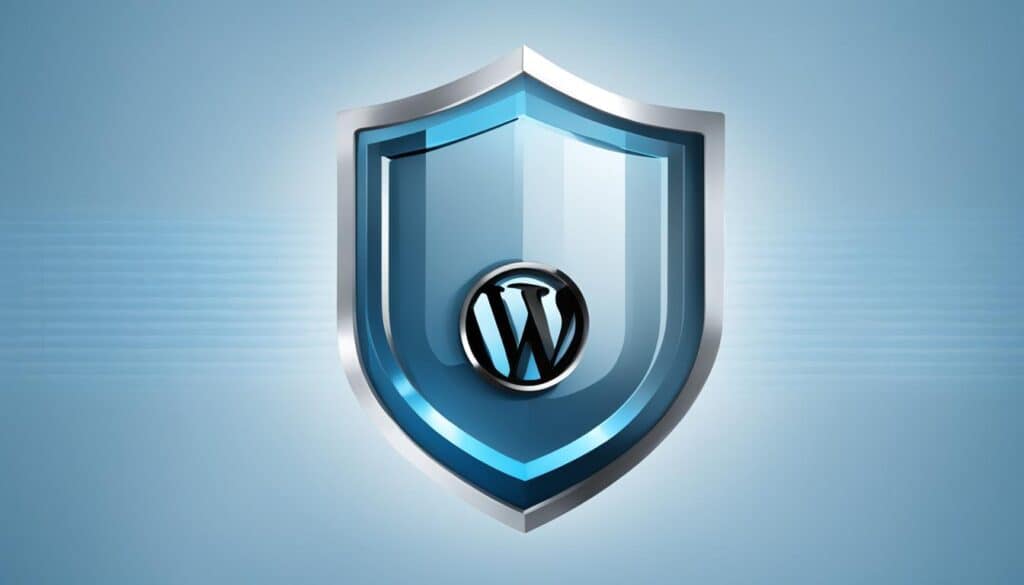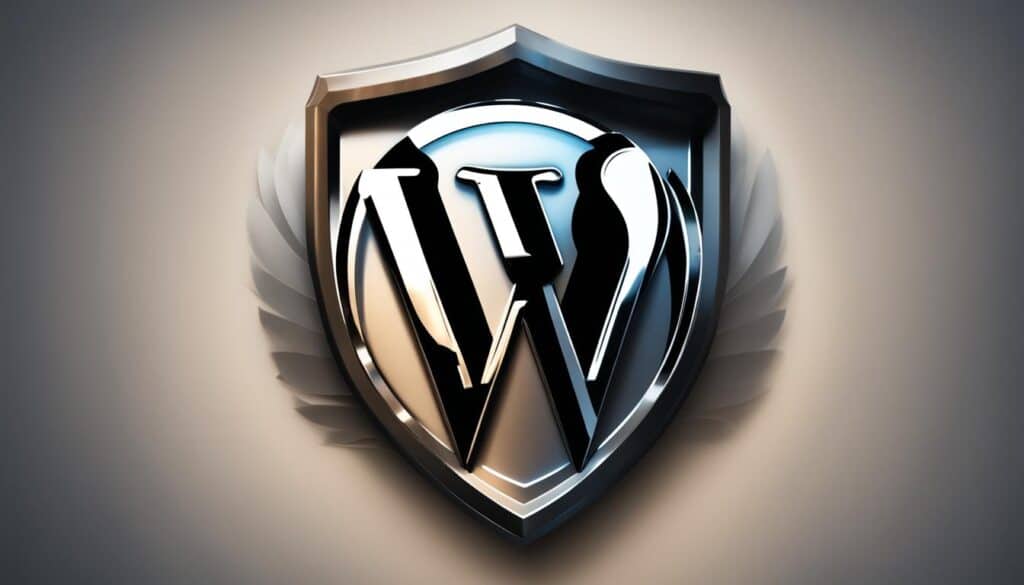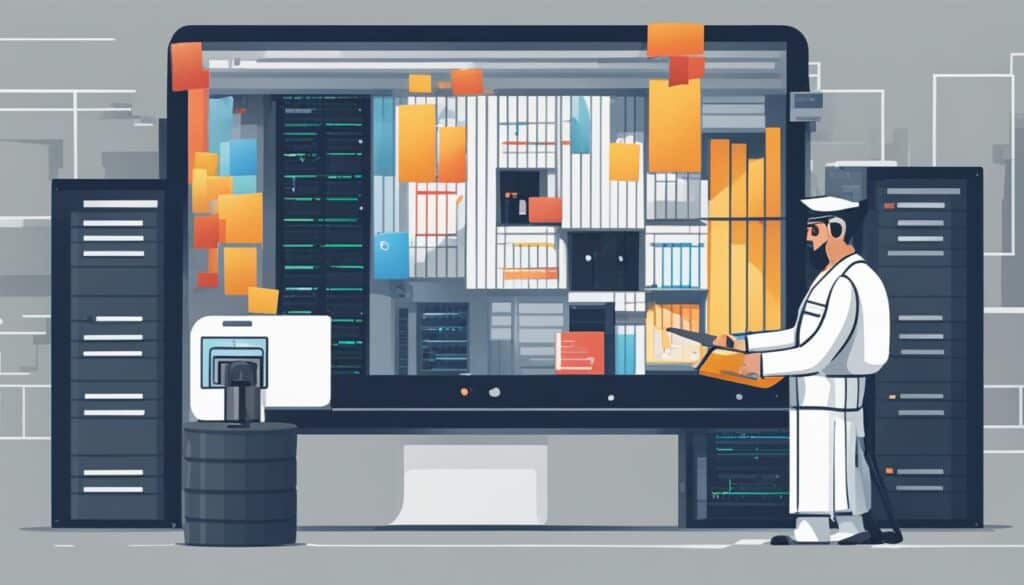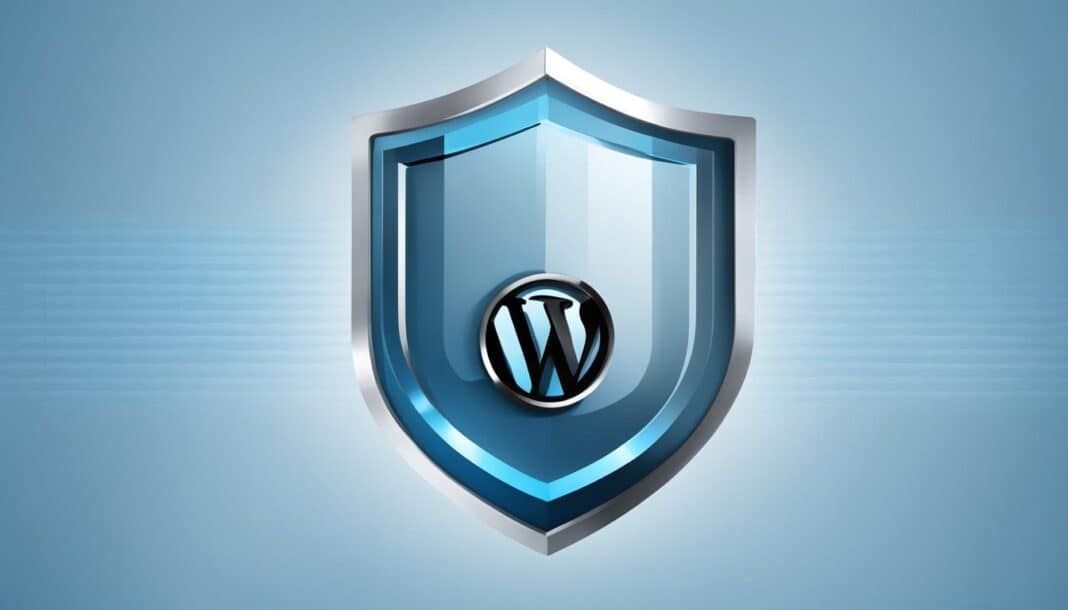Welcome to our comprehensive guide on the best practices for enhancing security on your WordPress site. In this article, we will provide you with actionable tips to help you protect your website from potential threats and safeguard your online presence effectively.
Website security is crucial for any online business or brand owner, and neglecting it can lead to disastrous consequences like data breaches, malware attacks, or worse.
By investing in WordPress security measures and implementing best practices, you can secure your website and enjoy peace of mind.

Key Takeaways
- Implementing WordPress security measures is crucial for protecting your website’s data and online reputation.
- Strengthening user access control, updating WordPress core and plugins regularly, and implementing security plugins are some of the best practices you can follow.
- Securing file permissions, getting SSL certificates for secure connections, regular backups and restoration plans, and continuous monitoring and auditing of your site are also essential for a secure online presence.
- Education is crucial for ensuring that your team is aware of the latest security trends and adheres to WordPress security best practices.
Importance of WordPress Security
The world of the internet is full of potential threats, and your WordPress website may also become vulnerable to attacks without adequate security measures. With over 60 million websites using WordPress, security is a major concern for website owners. Neglecting website security may lead to hacking, data breaches, and various other consequences that can harm your online reputation and business.
There are several reasons why prioritizing WordPress security is essential. Here are some of the most crucial ones:
- Protecting sensitive data: Your website may contain valuable data such as user information, personal details, and financial information. With proper security measures, you can protect this data from being compromised.
- Maintaining website performance: Security breaches affecting your website can create problems such as slow loading speeds and server crashes. This can significantly impact user experience and lead to loss of traffic and revenue.
- Preventing website downtime: A successful security breach can lead to website downtime, which can impact your business operations and reputation.
- Ensuring compliance: Depending on your location and industry, you may be required to follow specific regulations or compliances. WordPress security measures can help you comply with these regulations.
- Protecting against legal liabilities: Inadequate website security can lead to legal issues such as lawsuits and financial penalties.
It’s crucial to invest in protecting your WordPress site to secure your online reputation, maintain website performance, and protect sensitive data. In the following sections, we’ll explore the best practices for enhancing WordPress security and protecting your website from potential threats.
Strengthening User Access Control
One of the critical measures for enhancing WordPress security is managing user access control. By limiting user privileges and strengthening passwords, you can ensure the security of your website. Strong passwords make it difficult for unauthorized persons to gain access to your site, while limiting user privileges allows you to maintain control over who has access to certain parts of your website.
For secure website login, we recommend using a two-factor authentication process that requires an additional layer of authentication after providing the login credentials. With two-factor authentication, even if a potential hacker gains access to your password, they still won’t be able to access your website.
Best practices for managing user access control
Below are some best practices for managing user access control.
| Best Practices | Description |
|---|---|
| Limit user privileges | Only grant access to users who need it. Limit access to only those parts of the website necessary for their job or task. |
| Create strong passwords | Use complex and unique passwords for every user account and require regular password updates. |
| Implement two-factor authentication | Add an extra layer of security by requiring an additional authentication method beyond just a password. |
By implementing these practices, you can enhance the overall security of your website and protect it against potential attacks. Keep in mind that these measures are only the beginning, and it’s crucial to remain vigilant and stay informed about the latest WordPress security measures to stay ahead of potential security threats.
In the next section, we’ll discuss the importance of regularly updating the WordPress core and plugins to maintain a secure website.
Regularly Update WordPress Core and Plugins
Keeping your WordPress core and plugins up to date is crucial in maintaining a secure website. Outdated software can leave your site vulnerable to attacks, making it easier for cybercriminals to gain access to your data. To prevent such risks, it’s recommended to perform regular updates to the WordPress core and its plugins.
To begin with, ensure that you’re using the latest version of WordPress. You can check this in your WordPress dashboard by clicking on the “Updates” section. The dashboard will show you if there are any updates available for your WordPress core, themes, and plugins. If there are any pending updates, it’s essential to install them as soon as possible.
When updating the WordPress core and its plugins, keep in mind that some plugins may not be compatible with the latest version of WordPress. Therefore, it’s recommended to check which plugins may not be compatible and to find alternatives before updating. This way, you can minimize the risk of breaking your website’s functionalities.
Regularly updating your WordPress core and plugins can help protect your site from potential security threats. It ensures that your website is running on a secure platform and minimizes the risk of security breaches. Thus, make it a habit to perform regular updates to keep your WordPress site secure.

Implement Reliable Security Plugins
If you want to secure your WordPress site, using reliable security plugins is a must. There are many options available, but selecting the right one can be overwhelming. Here are some of the top WordPress security plugins:
| Name | Description |
|---|---|
| Wordfence Security | One of the most popular WordPress security plugins, Wordfence Security provides an all-inclusive security solution, including malware scanning, firewall protection, login security, and IP blocking. It also offers real-time threat defense feed to keep your website safe from the latest security threats. |
| iThemes Security | Formerly known as Better WP Security, iThemes Security is a comprehensive WordPress security plugin that offers features such as two-factor authentication, malware scanning, brute force protection, and file change detection. It also includes options to hide WordPress login, remove unnecessary metadata, and much more. |
| All In One WP Security & Firewall | This plugin provides an easy-to-use interface, allowing you to fortify your WordPress site effectively. It offers blacklisting and IP blocking, user account security, login security, and backup functionality for your website’s files and database. The plugin also provides a Security Grade feature to track and evaluate the security level of your site. |
Using any of these plugins can significantly enhance the security of your WordPress site. However, it is important to remember that installing a security plugin is not enough to safeguard your website. Regularly updating and configuring your chosen plugin is necessary to keep your site secure.
To further secure your website, you can also use other plugins such as Jetpack Security or SecuPress. It’s important to carefully research your plugin options and choose the one that best suits your needs.
Secure File Permissions and Hosting Environment
Securing your WordPress site goes beyond just software updates and security plugins. It’s essential to ensure that your file permissions and hosting environment are in line with industry standards. Here are some tips to follow:
Setting Appropriate File Permissions
File permissions enable you to control who can access, read, and write your website’s files. It’s crucial to set appropriate file permissions for directories and files that are accessible through your website. Here’s a general rule of thumb:
| File Type | Permission |
|---|---|
| Directories | 755 |
| Files | 644 |
These permission settings will allow you to give the appropriate access to users while ensuring that sensitive data isn’t easily accessible to unauthorized users.
Choosing a Secure Hosting Provider
Selecting a secure hosting provider is an essential aspect of WordPress security. Look for providers that offer a secure infrastructure, including regular backups and updates, SSL encryption, and malware scanning. A reputable hosting provider can help you take care of many of the security measures required to keep your WordPress site secure.
Implementing Additional Security Measures
Aside from file permission settings and choosing a secure hosting provider, there are other measures you can implement to enhance WordPress security. Consider configuring your site’s .htaccess file to limit access to sensitive files and directories or implementing security headers to protect against cross-site scripting (XSS) attacks. You can also implement Content Security Policy (CSP) headers or a Web Application Firewall (WAF) for added security.
Regular Backups and Restoration Plans
Backing up your WordPress site is vital to protect it from potential security breaches. Regular backups ensure that you can restore your website to its previous state in the event of an attack or other disasters, minimizing damage. You should make it a priority to back up your site regularly and have a restoration plan in place to ensure faster recovery times.
Protect your WordPress website and take action by implementing the following measures:
- Choose a suitable backup method, such as manual backups, backup plugins, or hosting provider backups.
- Schedule automatic backups to ensure that your site is saved regularly and that the backup files are updated.
- Store your backup files securely, such as on an external server, cloud storage, or a physical device.
- Test your restoration plan to ensure that your backups are working correctly and that you can recover your site if necessary.
- Consider the use of backup plugins that automate these processes, ensuring that your website’s data is secured with ease.
Regular backups and restoration plans should be part of your WordPress security best practices. By implementing a robust backup strategy, you can protect your website’s data, maintain business continuity, and enhance website security overall.

Implement SSL Certificate for Secure Connections
Implementing an SSL certificate is an essential step in establishing secure connections between your WordPress site and its visitors. SSL encryption works by securing communication between the server and client, protecting sensitive information from being intercepted by hackers. By ensuring that your website has a valid SSL certificate, you can prevent cyber attacks and provide a safer browsing experience for your users.
The SSL certificate installation process involves obtaining a certificate from a trusted Certificate Authority (CA) and configuring your website to use it. Once you’ve installed the certificate, all website traffic will be routed through an encrypted connection, making it more difficult for attackers to intercept data in transit.
To get started with SSL implementation, contact your web hosting provider to check if they offer free SSL certificates. Alternatively, you can purchase an SSL certificate from a trusted provider and install it manually. Make sure to configure your website to use the new certificate and redirect all HTTP traffic to HTTPS for a more secure browsing experience.
In conclusion, implementing an SSL certificate is a crucial step in enhancing web security and protecting your WordPress site from potential threats. By enabling secure connections, you can safeguard your website and data, establish trust with your users, and improve your website’s search engine ranking.
Monitoring and Auditing Your WordPress Site
Monitoring and auditing your WordPress site is crucial in maintaining the security of your online presence. Regular check-ups help identify potential vulnerabilities, suspicious activities, and malicious attacks on your site, enabling you to take necessary measures for enhancing your website’s security.
Implementing website scanning can be an effective way of monitoring your site for security threats. There are several reliable scanning tools and plugins available that can help you detect potential threats and vulnerabilities in your site’s code and content.
Conducting regular security audits is another essential measure for maintaining a secure WordPress site. A security audit evaluates your website’s security systems, including the strength of your passwords, user access controls, and SSL certificate, and helps you identify areas that need improvement.
By regularly monitoring and auditing your WordPress site, you can stay updated on the latest security threats and take necessary measures to enhance your website’s security. This can help safeguard your online presence from potential attacks and protect your site’s data and information from being compromised.
“Never leave your website’s security to chance. Implement the necessary measures and stay updated on the latest security trends to ensure a secure online presence.”
Educating Yourself and Your Team on Security Best Practices
To enhance the security of your WordPress site, it’s crucial to educate yourself and your team on the latest security best practices. Here’s a checklist of essential security tips to keep in mind:
- Keep your WordPress core and plugins up to date.
- Implement strong passwords, along with two-factor authentication for added security.
- Regularly backup your website’s data and create a restoration plan to prepare for any potential attacks or data loss.
- Choose a secure hosting provider and configure your file permissions appropriately.
- Install reliable security plugins to safeguard your site against common security threats.
- Implement an SSL certificate to establish secure connections between your website and its visitors.
- Continuously monitor and audit your WordPress site for potential security vulnerabilities.
By following these WordPress security best practices, you can ensure that your website remains secure and safeguarded against potential threats. Stay up to date with the latest trends and security measures in the WordPress community to maintain the highest level of protection for your online presence.


